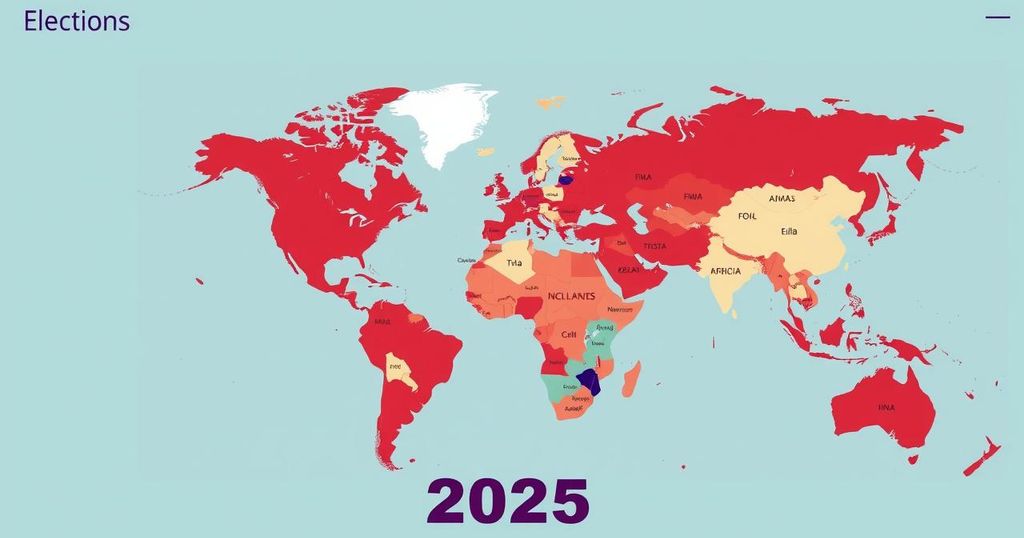In 2025, several countries will conduct significant elections that may reshape political landscapes, including Belarus, Germany, Canada, Australia, and Egypt. Each election brings unique challenges, incumbents facing opposition, and the potential for major shifts in governance, reflecting both domestic and international implications.
In 2025, no less than twelve key elections will be conducted globally, potentially reshaping national landscapes in several countries. The elections follow a high-stakes 2024, whereby significant political changes occurred in numerous nations. Among the spotlighted elections are those in Belarus, Germany, Canada, Australia, and Egypt, each presenting unique dynamics that could influence political stability and governance.
In Belarus, the January 26 election sees President Alexander Lukashenko seeking his seventh term amid a backdrop of opposition led by Sviatlana Tsikhanouskay, who remains in exile due to repression. With the power largely consolidated under Lukashenko, election outcomes seem predetermined despite the opposition’s push for change.
Germany’s February 23 election reflects a shift in coalition dynamics after the governing coalition’s collapse. Incumbent Chancellor Olaf Scholz of the Social Democrats faces criticism while the center-right Christian Democrats, led by Friedrich Mertz, currently lead in the polls. The eventual coalition composition remains uncertain, hinging on the election results and smaller party performances.
In Canada, Prime Minister Justin Trudeau’s electoral prospects are tenuous in light of low approval ratings and rising opposition led by Pierre Poilievre. Polls indicate a potential Conservative majority, with Trudeau’s Liberal Party significantly trailing. Elections must be held by October 20, 2025, but they may occur earlier depending on opposition strategies.
Australia plans two election dates in 2025, with Senate elections concluding by May 17 and House elections by September 27. Incumbent Prime Minister Anthony Albanese confronts declining popularity, while his rival, Peter Dutton of the Liberal Party, appears to gain momentum despite the challenges of parliamentary dynamics.
Lastly, Egypt will conduct parliamentary and Senate elections by December 2025, following President Abdel Fattah el-Sisi’s recent re-election. With a substantial portion of the parliament elected through controlled mechanisms, the concentration of power remains an ongoing concern for observers.
The political landscape in various countries worldwide is continuously evolving, particularly as nations prepare for significant electoral events. The elections in 2025 come on the heels of dramatic shifts observed in 2024, emphasizing the transformative power of the electoral process. A series of elections not only serve as a mechanism through which citizen voices are expressed but also fundamentally influence governance, policymaking, and diplomatic relations at large. High-profile elections across the globe signal moments of critical change that may affect regional stability and international relations.
As the world approaches 2025, the upcoming electoral events in Belarus, Germany, Canada, Australia, and Egypt warrant close attention due to their potential repercussions on domestic and international levels. Each election embodies distinct challenges and political dynamics that may usher in changes in leadership and policy directions. These pivotal moments reflect broader trends while simultaneously offering insights into the political sentiments and concerns of the respective electorates.
Original Source: www.usnews.com






